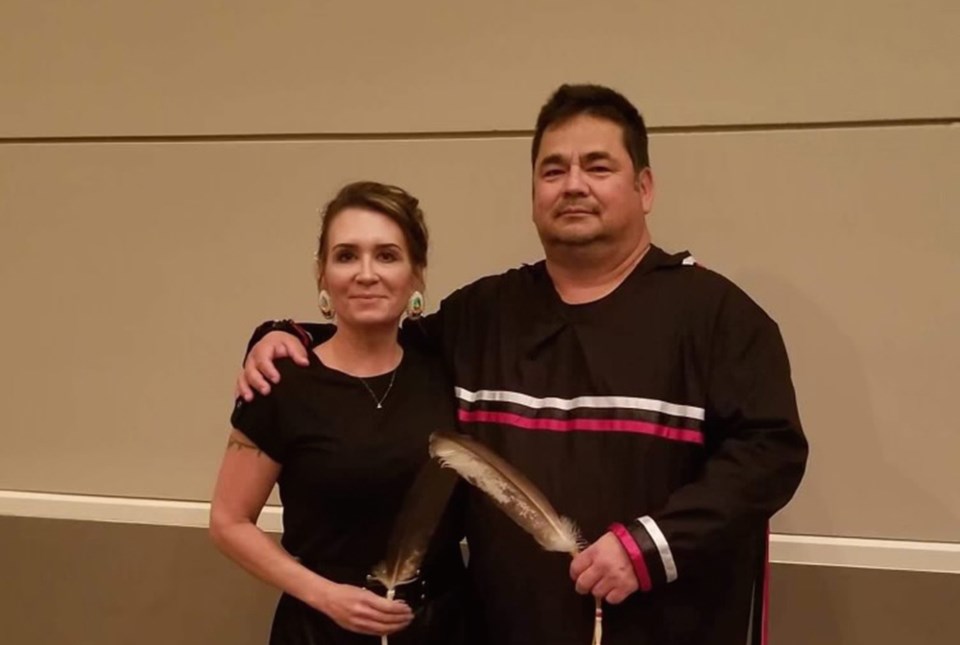ESTEVAN — Tony Stevenson wants people to know about his experiences in residential schools, how they shaped his life and how they continue to impact Indigenous communities in the province.
Stevenson, who is originally from the Cote First Nation and a part of the Anishinaabe First Nation, will speak at the Royal Canadian Legion’s Estevan branch on Sept. 28, starting at 7 p.m., and the following day at 9:30 a.m. Stevenson will also show a video each day.
Joining him will be his wife Marcie McArthur-Stevenson, who hails from the Pheasant Rump First Nation and is also a residential school survivor. Stevenson will do the bulk of the speaking, while his wife looks after the audio-visual component. He noted a lot of female audience members will approach his wife after the event.
The couple started sharing their experiences about three years ago, but then the COVID-19 pandemic halted their efforts. This year has been their busiest yet.
The presentations are a result of the legal compensation process, he said. Stevenson worked for two law firms in Regina as an agent, acting on behalf of the survivors.
“I lost both firms because they didn’t treat the people right. They weren’t equipped to handle the psychological backlash, the emotional turmoil that these repressed memories that set my residential family off. Many have passed on. Many have revisited a rough life with drugs and alcohol,” said Stevenson.
People weren’t equipped to deal with these repressed memories, and when they relived them through hearings, they did not recover.
Some of the questions he gets will be how to help Indigenous peoples get over this. He replies they don’t, because it’s a life-long battle.
“You see first-hand how this affects us mentally and emotionally. The way I feel people can help is talking about, to their kids, to their family members, about this history that hasn’t been taught in schools. That’s what helps us the most,” he said.
There are a lot of Band-Aid solutions, but people have to be prepared to hear and accept the truth, he said. Stevenson asked how many Indigenous people are at the helm of big corporations.
He recalls that when working for a pipeline company, some non-Indigenous people made comments about a young Aboriginal man who was shot by a farmer up north. Some of his co-workers made racist remarks.
He was told by the company and the union to forget about it and move on.
“This is the kind of stuff that creates the triggers. We can’t move on. The racist, ignorant attitude has to be stopped,” said Stevenson, who encouraged them to learn history and the spirit of the treaty.
He also recalled being part of a project that garnered provincial awards for a business to hire and retain Indigenous employees, but many of those who were hired eventually left.
“Things like that are created by a lack of education, lack of awareness. The idea is to get to all of the schools, all of the colleges and universities, places of business, some much-needed education,” said Stevenson. “There is so much ignorance out there that it hurts our people.”
Through reasonable dialogue, his goal is to address these issues in the best way he can and that’s by being honest and sharing his experiences.
“I can stand up there in front of a group or a crowd with a PowerPoint presentation with 50 pages, explaining this is the perks of the treaties and this is the downside,” he said. “Our goal is to make sure that the participants who come into the room, that partake in this presentation, leave with a feeling of empathy, that they understand that’s what it’s like to be ostracized because of the colour of your skin, your ethnic origin, and to be treated unequally.”
Stevenson’s first exposure to the residential schools came when he played hockey as a visitor at the Qu’Appelle Indian Residential School in Lebret. His uncle was a head childcare worker. He was a student at the school from 1981 to 1991.
His wife started at a residential school in Grade 3 in 1979.
He finds people are often surprised to find out the last residential school didn’t close until the late 1990s.
In the first year they had the presentations, they had four and then grew it to 12. They have 15 or 16 this month alone, he said. And with the National Day for Truth and Reconciliation coming up on Sept. 30, they expected to be busy.
Stevenson said many in the audience are hearing them for the first time. They weren’t taught them in schools or universities.
“They wish they would have learned it. They wish they would have learned,” said Stevenson.
The money that residential school survivors received didn’t take away the hurt and the pain that they have experienced.
“When I saw the anger and the loss and the emotions from everyone that I worked with, it takes its toll on you. Their final wish was that their stories be told, the truth be told. That’s one of the main drives, wone of the reasons we do this,” he said.
Stevenson said he is glad the general public is starting to accept the history of Indigenous people. If it weren’t for the unmarked graves being found at former residential school sites last year, he believes these discussions wouldn’t be happening.
Stevenson has won a number of awards and recognitions over the years, including a Queen’s Diamond Jubilee Medal.
The Estevan Downtown Business Association, Southeast Newcomer Services, Southeast Advocates for Employment, McDonald's Estevan, Impact Creative SK and A&A Jewellery are bringing Stevenson to Estevan. His presentation is for those at least 16 years of age.




